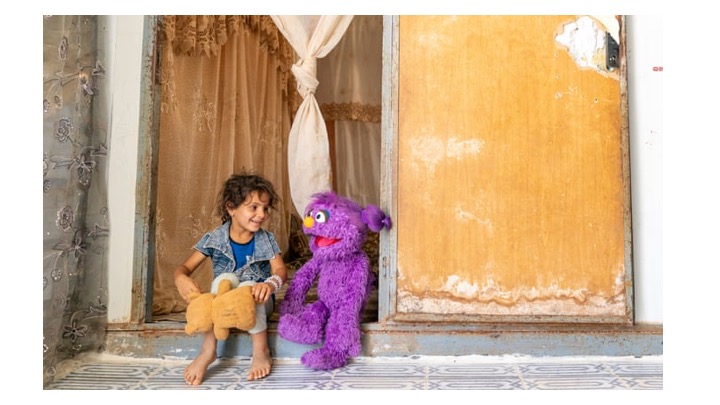How a new Sesame Street show is bringing Muppet magic to refugee camps

Basma making a new friend in Za’atari Camp, Jordan. Photograph: Ryan Donnell/Sesame WorkshopCooperation, kindness and the alphabet.
Written by Harriet Grant - The Guardian
Supported by, Humanity United
For over 50 years, the characters of Sesame Street, from the Cookie Monster to Big Bird, have helped children from diverse backgrounds navigate the challenges of life as a small person in a big world.
From the moment it launched, Sesame Street has unflinchingly dealt with difficult issues – and from this week they are bringing their special brand of magic to the children who need them the most.
Ahlan Simsim will premiere on regional children’s television as well as on YouTube – created for the displaced and traumatised refugee children living in Syria, Jordan, Iraq and Lebanon.
Scott Cameron, executive producer at Sesame Workshop, told the Guardian that the team worked with educational experts and psychologists across the region.
“There will be content in there that is particularly relevant to refugee children, but we wanted to identify story lines that will appeal to all children. All of our advisors recommended identifying and managing emotions. Unless you create a strong foundation to talk about how you are feeling, and how to identify emotions like anger and sadness, then it’s difficult to deal with other crucial goals like how to understand others perspectives.
“So we looked at how to help children aged three to eight deal with emotions. For example, when looking at fear we have an episode where Basma is scared of the dark. That is a good way to talk about being afraid because so many children are scared of the dark.”
There are plans to use the work and the puppets to do far-reaching work in communities across the Middle East. But Cameron emphasises that play must underpin all the work done for these vulnerable children.Advertisement“It is our job to educate, but it’s also our job to bring joy and laughter. All of the research shows that play helps develop emotional resilience as well as educational attainment.”
Marianne Stone, programme director at the International Rescue Committee (IRC), which has partnered with Sesame Workshop to run the programme, said the show is urgently needed to help children who are suffering during a key stage in their development.
“Children who suffer the daily effects of violence and neglect are at high risk for experiencing toxic stress, a disruption of neurological and biological processes due to severe, prolonged stress and the absence of nurturing care.
“Children who experience toxic stress during critical stages of brain development are at severe risk for impairments that will follow them throughout their lives.”
The show will focus on identifying and managing emotions, and is part of a wider child-centred intervention, with thousands of outreach workers going to clinics, community centres, homes and other gathering spaces in the four countries to work on the lessons discussed in the programmes.
The show follows five-year-old Muppet best friends Basma and Jad and a friendly goat called Ma’zooza as they experience and discuss troubling emotions. Each time, Basma and Jad learn to manage their feelings by using strategies such as counting to five, belly breathing, and expression through art. The second half of each episode is a variety show segment, when real kids and celebrity guests join the characters to play games and sing songs that reinforce the episode’s educational content.
Since Syria erupted into conflict in 2011, more than 5 million children have become refugees, with huge numbers living in camps across neighbouring countries. There are massive gaps in the provision of both early years support and education for these children, many of whom are suffering the traumatic effects of witnessing extreme violence.
Sesame Street is known for helping children deal with the varied problems of childhood through onscreen characters and storylines.
In 2017, the team introduced a new character to its ranks – a Muppet called Julia, who has autism. And last year a little green Muppet called Karli was brought in to help children whose parents are addicted to opioids.
“The needs of young children are so often invisible in humanitarian settings. Currently, less than 3% of all humanitarian aid supports education, and only a small fraction of that supports early education,” said Dr Sarah Smith, senior director of education at the IRC. “Our direct services across the Syrian response region, which integrate the new Ahlan Simsim show and accompanying educational materials, provide playful early learning opportunities that can put millions of refugee children – and their new neighbours in host communities – on the path to brighter futures.”
Sesame Street has had a presence in the Middle East for 40 years, with local Egyptian, Jordanian, Palestinian, and Israeli versions of Sesame Street. Produced in Amman by Jordan Pioneers, the new Ahlan Simsim show is brought to life by a team of writers, producers, and performers from across the region.
|